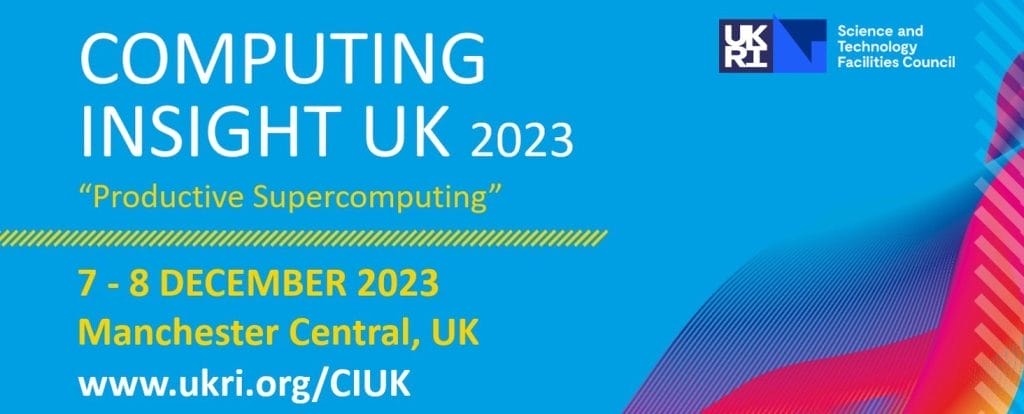Dec 2023
ExCALIBUR at CIUK
Computing Insight UK is the UK’s leading conference for scientific computing. Held in early December each year, it attracts hundreds of delegates to Manchester to discuss the latest trends, technologies, and goings-on in the field. This year’s conference is running on Thursday the 7th and Friday the 8th, with a preliminary day zero on Wednesday the 6th. There is an overarching theme of Productive Supercomputing, with more details available here. ExCALIBUR is involved in several parts of the conference and-so it will be a busy few days for the programme.
ExCALIBUR focus session
The morning of the first day of the conference, Thursday, sees an ExCALIBUR focus session which will be running from 09:30 to 12:30. The idea of this breakout session is to enable projects to deep dive into specific technical aspects of their work and to use this as a springboard for driving collaborative discussions both with other ExCALIBUR projects and other UK activities more widely. The session comprises short talks from 15 of the ExCALIBUR projects and the schedule is as follows:

ExCALIBUR booth
We will also have a booth in the CIUK research zone, displaying posters on a rolling basis that highlight different projects in the programme. Furthermore, we will be showing a rolling video highlighting some of the key achievements to date and on-going activities to give attendees a deeper understanding of ExCALIBUR and insight into some of the work being undertaken. There will be an ExCALIBUR representative at the booth throughout the two days of CIUK, so if you have any questions about ExCALIBUR then please do pop by and chat with us. Furthermore, we have some merchandise to give away – so come grab an early Christmas gift!
Main programme talks
The CIUK main programme, comprising invited and contributed talks, is always packed full of a wide range of interesting topics. This year two of the main programme talks are provided by ExCALIBUR projects, both of which are on the Friday morning.
Between 11:30 – 12:00 on Friday the 8th, Alistair Basden from Durham University will be giving the talk A foray into composable infrastructure for HPC which describes the work undertaken by several of the ExCALIBUR H&ES testbed projects that are housed at Durham. One such project is the Rockport testbed which leverages a high performance 100G switchless networking technology. This is highly modular and provides linear scalable to thousands of nodes, with the idea being that by removing the switch from the network the one can gain increased performance at lower energy cost. The Compute Express Link (CXL) technology demonstrator testbed, run by Durham and also part of Alistair’s talk, provides full composable memory and cache coherent memory sharing between remote nodes, where it is possible for codes to view a distributed memory system as one single address space. This has the potential to significantly simplify programming parallel codes, however applications need to be optimised for the technology and this is one of the key areas that the H&ES project has been exploring.
Subsequently, between 12:30 and 13:00 on Friday the 8th, Nick Brown from EPCC and Emilien Bauer from the School of Informatics, both at the University of Edinburgh, will be doing a double act and giving the talk Making HPC more accessible: Effective HPC programming via domain specific abstractions. This is from the xDSL project where they will be talking about developing a common ecosystem for Domain Specific Languages (DSLs) atop the ubiquitous MLIR compiler framework. With the CIUK theme of productivity in mind, DSLs significantly lower the barrier to programming complex, heterogeneous, supercomputers. However, a major challenge is that the underlying compiler ecosystems can be siloed which results in a lot of work for each DSL and uncertainty over long term maintenance. The team are aiming to solve this by making DSLs a thin abstraction layer atop the common, widely developed MLIR compiler infrastructure. Their work has also included enhancing the MLIR ecosystem itself to also make it more suitable for HPC.